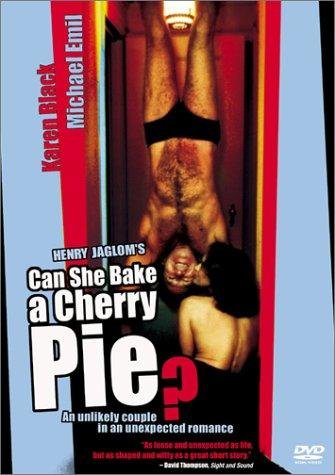
CAN SHE BAKE A CHERRY PIE
US, 1983, 90 minutes, Colour.
Karen Black, Michael Emil, Michael Margotta, Frances Fisher.
Directed by Henry Jaglom.
Can She Bake a Cherry Pie is an engagingly offbeat New York comedy. It was written and directed by idiosyncratic director Henry Jaglom, (A Safe Place, Tracks, Sitting Ducks). It is a gentle romance between an unlikely couple. Karen Black is excellent as the woman whose husband has walked out on her, who is a mixture of volatile moods and who encounters middle-aged Michael Emil. Emil appeared in Jaglom's Sitting Ducks and was the Einstein character in Insignificance. There is an interesting gallery of supporting characters led by Michael Margotta.
The film uses New York locations and streets, passers-by actually looking at the actors and at the cameras. This gives a kind of realism with distance. The audience knows that the characters are being acted professionally. In fact, many of the situations seem to be improvised - and have the tentativeness of conversation as well as the cleverness of interpretation. The traditional song, played by a band in the street, is an evocative chorus for the whole film.
1. A New York comedy? Offbeat? American? Universal? A human comedy?
2. The work of Henry Jaglom, his few films, idiosyncratic, improvising of characters and situations, the ensemble working for creating an atmosphere? Attitudes, talk?
3. The title, the traditional song, the lyrics? As played by the band throughout the film? Highlighting themes of the relationships between men and women? Evocatively played throughout the film?
4. The introduction to Zee and Ell? Zee and her walking, talking to herself, a woman of New York? Her memories of her husband walking out on her, plea for him to stay, packing and unpacking? Her emptiness? The kind of person she was, her potential? The contrast with Ell and his work, his listening to Mort, his advice, his own divorce, daughter? Discussions about women, relationships, picking up women in single bars? His potential?
5. The irony of each meeting at the cafe? Zee and her continual changing of order, being fussed? Eli and his approach? Mort wanting to meet women - but the observer? Eli's talk, sincere and earnest, his views on everything, focus on health? Zee's paranoia about being followed by a detective, her fear of her husband? Comedy of suspicions? Seeing each of them in their home, the beginnings of the affair, hesitance, compliance? The quality of the relationship? Its effect on each of them? Meeting again? Sharing, talking, expectations? The oddities of Zee's moods? Ell and food, exercise, hanging upside down in the cupboard? At the cafe and the pigeon man, his flirting? Seeing Zee going off with him, the sexual encounter, thinking he was the detective after seeing the photos? the girlfriend, talk, sympathy, going home? Zeel’s outburst add the reconciliation? An odd couple? A possible future?
6. Karen Black's style as Zee: defining the character, bitter experiences, the husband, the leaving, being hurt, tensions, continued smoking, reaction to Eli's views about health? Sharing the outings? Going to the old MGM musicals? Museums? Cafes? her changing, suspicions? Larry and the possibility of an affair? Her paranoia about being followed? Feeling free and returning to Eli?
7. Eli and his age, work, needs, family, relationships? His living in his head? Talk? Mort and advice? The encounter with Zee and his beginning to change?
8. Mort and his talk, his mother, inhibition with girls, the stories, going out, the cafe, observing, a failure with women?
9. Larry and the pigeons, throwing them out and receiving them back, rhythms? The theme song? His girlfriend, flirting at the cafe, the beginning of an affair, the photos? was he a detective?
10. His girlfriend and her emotionalism? Going home with Eli? The break-up? The others at the cafe and their reaction?
11. The film's attention to New York detail, walking the streets, the people watching the characters and the camera - and its dramatic effect? Naturalism? Realism? Authentic and contrived? The buskers and their song? Orson Welles as the magician (from A Safe Place) appearing on television? The film as a fable about relationships?
12. A piece of Americana, bittersweet insights?